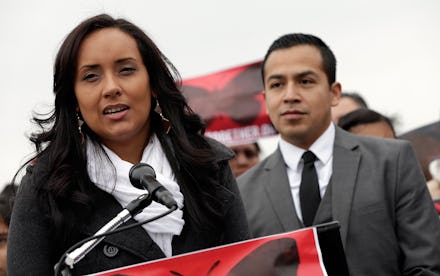These undocumented Dreamers were outspoken before Trump. They're going to stay that way.

Erika Andiola remembers the day Immigration and Customs Enforcement came for her family. In January 2013, the young undocumented activist heard a knock at the door. She turned to see eight ICE agents seize her mother and brother, who were in the country without authorization and slated for deportation.
After the agents left, Andiola released a YouTube video detailing the events of the arrest, which quickly went viral. She called organizers, attorneys and people on Capitol Hill. By the end of the day, Andiola got a call from the Mexican consulate telling her that her mother and brother would be coming home.
"It was a big tactic for us to come out of the shadows to tell our stories," said Andiola, who co-founded immigrant-rights group Dream Action Coalition. Andiola also ran Hispanic media for Bernie Sanders' 2016 presidential campaign and is now the political director for the grassroots group Our Revolution.
Andiola is one of an estimated 1.8 million undocumented immigrants who entered the country as children. Called "Dreamers" — after the DREAM Act (Development, Relief and Education for Alien Minors) — this group was granted temporary legal status under the Obama administration's Deferred Action for Childhood Arrivals (DACA) program.
Throughout President Barack Obama's tenure, a handful of Dreamers like Andiola have become well-known critics of U.S. immigration policy, advocating on behalf of the estimated 12 million people in the country without authorization. As President Donald Trump cracks down on illegal immigration, the most visible among them fear retribution from the administration for speaking out.
They have reason to be wary. While Trump has said DACA recipients will not be targeted in his deportation crackdown, Immigration and Customs Enforcement (ICE) has already arrested several Dreamers — at least two of whom remain in custody. Even if Dreamers are safe, almost all of them have family members in the United States who are eligible for deportation.
"I am worried. I have to check in on my mom, who is undocumented — she's 72 years old," said César Vargas, New York state's first undocumented attorney. Vargas is one of the other co-founders of the Dream Action Coalition and also a former staffer for the Sanders campaign. "My mom also has to check in on me, something she didn't have to do as often before."
Despite those risks, several Dreamers with high profiles told Mic that they were not about to let his election keep them from speaking out.
"For me what's most important is to continue to tell my story — to let people know I'm their neighbor, I'm their friend, I'm their colleague," Vargas said.
Dreamers began speaking out during former President Barack Obama's first term. As a candidate, Obama had pledged to reform the immigration system and provide a "path to citizenship" for those in the country without authorization. In an attempt to curry favor with hardline Republicans, the Democratic president invested heavily in enforcement, deporting a record 2.5 million people between 2009 and 2015.
Only after sustained organizing from organizations like the Dream Action Coalition and United We Dream — organizations founded during that same period to protest Obama's deportation policies— did the Obama administration shift focus from courting an inflexible Republican Party to protecting the undocumented from deportation during his second term.
The era of President Donald Trump has brought with it a whole new set of challenges for organizers.
"We no longer have to convince the public that we're not going to be able to find protections through an administration," said 25-year-old organizer Maria Cabello, who works with the group Movimiento Cosecha, an immigrant rights group responsible for several major anti-Trump protests during the campaign.
Movimiento Cosecha's core strategy is to highlight the labor and consumer power of undocumented people in the United States, encouraging Americans to appreciate the degree to which they rely on non-citizens. Last month, immigrants across the country took part in A Day Without Immigrants, in which businesses closed their doors and immigrant workers joined in a general strike. Five months ago, a group of Movimiento Cosecha organizers, including Cabello, chained themselves to the entryway of Trump Tower in New York City to highlight the fact that the tower had been build using immigrant labor. The demonstrators were arrested for the action.
"We knew [before the election] that we needed to show that Trump and people like Trump benefit from the labor of undocumented immigrants and that their empires wouldn't have been able to be built without people like us and our parents" Cabello said. "Now that he's elected, we need to continue that work."
While groups like Movimiento Cosecha work to raise awareness nationally about the importance of immigrant labor, longtime anti-deportation activists like Vargas are working to protect local immigrant populations from deportation.
"It's a necessity to organize locally," said Vargas, who is currently helping facilitate training sessions in New York's Staten Island neighborhood on how to prevent deportations. The training includes lessons on how to resist ICE raids in one's neighborhood and meetings with local law enforcement to help immigrants understand the separation between municipal police and federal immigration officials.
But Vargas said his group's goal is to "not just mobilize the immigrant community, but also mobilize and bring on board our citizen allies to act as a first line of defense."
Though this kind of work puts them front and center in the fight against Trump's policies, activists say that the support they receive from their communities and the communities they're building helps them feel secure.
"Our families are worried about us," Cabello said when speaking about her parents' feelings toward her continued activism in the Trump era. "They know why I'm doing this and they don't ask me to stop, but they do ask me to be careful.
"They understand that the undocumented community needs to be at the forefront of this because we're the ones being attacked."